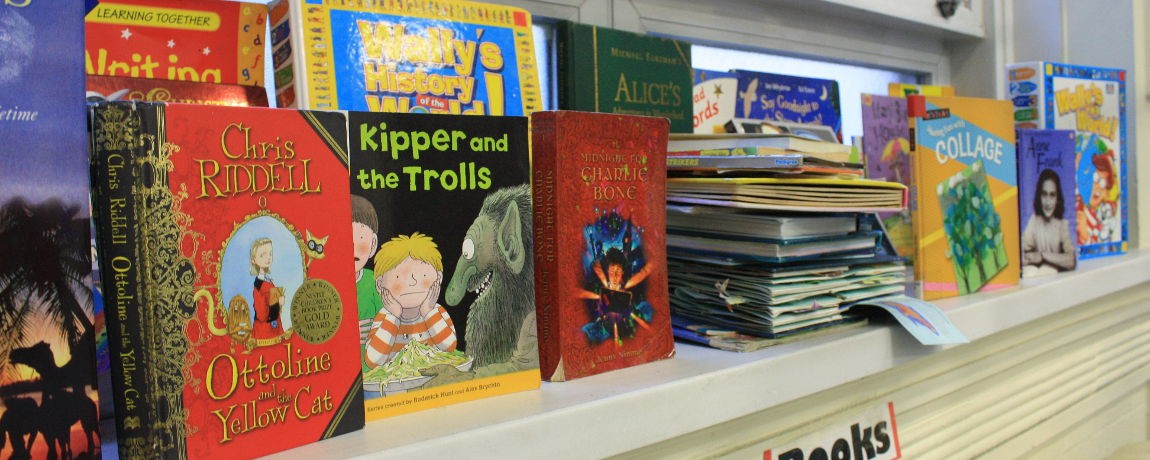Helping Your Child to Read

Learning to read is the most important thing your child will learn at our school. Everything else depends on it, so we work hard to make sure that as well as developing a love of books, every single child learns to read as quickly as possible.
How will my child be taught to read? How long will it take to learn to read well?
The programme we use is called Read Write Inc. Phonics.
We start by teaching phonics to the children in the Reception class. Teaching phonics mean that they learn how to ‘read’ the sounds in words and how those sounds can be written down. This is essential for reading, but it also helps children learn to spell well. We teach the children simple ways of remembering these sounds and letters and also practise reading (and spelling) what we call ‘tricky words’, such as ‘once,’ ‘have,’ ‘said’ and ‘where’.
They practise with books that match the phonics and the ‘tricky words’ they know which does wonders for their confidence. The teachers read to the children, too, so the children get to know all sorts of stories, poetry and information books. This way, they learn many more words and it also helps their writing.
By the end of Year 2, most children should be fluently reading, without Phonics, books that are at the appropriate level for their age. In Year 3 these children then move on to understand what they are reading, to help them progress with their spelling and writing. If required, we will use Phonics to help older children catch up and for children new to English.
Why Read Write Inc Phonics?
- It is a complete literacy programme that is systematic and structured.
- It meets the demands of the new national curriculum, thereby giving your child the best chance of success in national tests.
- The assessment is rigorous and effective with one-to-one tutoring, if required, to ensure that no child is left behind.
- Your children are thoroughly supported with resources they can bring home that match their learning in class.
What can I do to help? Is there anything that I shouldn’t do?
Your child will bring different sorts of books home from school. It helps if you know whether this is a book that your child can read on their own or whether this is a book that you should read to them. The teacher will have explained which is which and will choose the book(s) that will help your child the most.
Sometimes your child might bring home a picture book that they know well. Please don’t say, ‘This is too easy.’ Instead, encourage your child to tell you the story out loud; ask them questions about things that happen or what they think about some of the characters in the story.
Help your child to sound out the letters in words and then to ‘push’ the sounds together to make a whole word. Try not to refer to the letters by their names, rather, help your child to focus on the sounds.
We know parents and carers are very busy people but if you can find time to read to your child as much as possible, it will help them to learn about books and stories as well as new words and what they mean. Show that you are interested in reading yourself and talk about reading as a family.
How to help your child at home:
- You can read stories with your child. Relentlessly!
- Read some stories at a higher level than they can read themselves.
- Listen to them reading their take home Phonics storybooks.
- Practise pronouncing sounds. Remember no ‘fuh’ and ‘luh’!
- Have fun with Fred Talk – eg: Where is your c_o_a_t? Make sure your child can tell you what the word is.
How will I know how well my child is doing?
We have various ways to assess the children in reading and use this information to decide what reading group they should be in. Your child will work with children who are at the same reading level but will move to a different group if they are making faster progress than the others. Your child will also have one-to-one support if we think he or she needs some extra help to keep up.
In the summer term, the government asks us to do a phonics check of all the Year 1 children to make sure that all our children are at the level that they should be for their age compared to all the children across the country. This gives us extra information about their progress. At every opportunity, we will talk to you about how well your child has done, and especially if we have any worries at all.
Recommended reading lists:
You may need Adobe Reader to view these PDF files.
What if he or she finds it difficult to learn to read?
We want children to learn to read, however long it takes us to teach them and we will find out very quickly if your child is finding reading difficult. If necessary, we move children to a different group, so that we can make sure that they have learnt what they need to know.
If they still struggle, we give them extra time with an adult, on their own. Your child will still be in the same group with the other children and won’t miss out on any of the class lessons. If we have any serious worries about your child’s reading, we will talk to you about this.
What if my child turns out to be dyslexic?
The way we teach reading is especially helpful for children who might be dyslexic. This is because Read Write Inc is a very well-organised programme that has a strong focus on phonics. This is very important for children who find learning to read difficult. As always, if you are worried about your child, please come and talk to us.
My child has difficulty pronouncing some sounds. Will this stop him learning to read through phonics?
This is not something to worry about and isn’t a problem for learning to read as long as we know what sound the child is trying to say. Many children have a few sounds that they can hear clearly but find it difficult to say, particularly the l-sound, r-sound, w-sound, th-sound, s-sound, sh-sound and j-sound. Often they say a t-sound for the c-sound; “tttssh” for the s-sound; “w” for the r-sound and “r” for the l-sound.
You can help your child by encouraging him or her to look at your mouth when you say the sound. Whatever you do, do not make your child feel a failure. They can easily learn to read, even if they find one or two sounds difficult to say.
